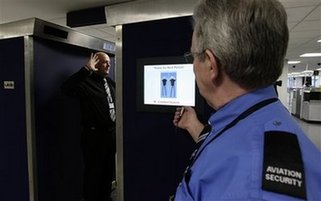Global General
EU nations divided on use of airport body scanners
(Agencies)
Updated: 2010-01-08 08:13
 |
Large Medium Small |
BRUSSELS: European nations were sharply divided Thursday over the need to install full-body scanners at European airports, with some EU members playing down the need for beefed-up security measures.
But the EU indicated it may force nations to comply.
Italy on Thursday joined the United States, Britain and the Netherlands as nations that have announced plans to install the scanners following a Nigerian man's reported attempt to blow up a US airliner flying from Amsterdam to Detroit on Christmas Day.
Washington is seeking enhanced security measures on all trans-Atlantic flights heading for the United States. That's a huge task, however, since European airports carry thousands of passengers on more than 800 flights a day across the lucrative North Atlantic route.
But as the EU aviation security experts met Thursday on the subject of scanners, Belgium's secretary of state for transport, Etiennne Schouppe, described such enhanced measures as "excessive," saying security requirements at European airports are already "strict enough."
Spain, too, has expressed skepticism about the need for body scanners, and the German and French governments remain uncommitted.
Germany's position is that three conditions must be satisfied before the scanners could be deployed, Paris said. They are that the scans will increase security, that they are not a health hazard, and that the scans do to not harm the individual's rights.
Some EU countries have expressed concern that full-body scanners will be dangerous to staff member and passengers because of the radiation they emit.
However, the American College of Radiology issued a statement Wednesday noting that a passenger flying cross-country gets more radiation from the flight at high altitude than from either of the two types of scanners the US Transportation Security Administration is using — presumably the same systems used in Europe.
One type, millimeter wave technology, used low-level radio waves — not radiation. The other technology uses very weak X-rays that give a radiation dose equivalent to flying for two minutes at 30,000 feet, the statement says. That is so small it does not penetrate skin so it is considered generally safe for pregnant women, said the college's spokesman, Shawn Farley.
Neither technology type poses concern for any health risks "since they don't penetrate into the body," said James Hevezi, head of the radiology group's medical physics commission and physics chief at Cyberknife Center of Miami, a cancer treatment center.
Until now, the EU has allowed member states to decide on whether to use body scanners at airport checkpoints. In 2008, the EU suspended work regulating the use of body scanners after the European Parliament demanded a more in-depth study of their impact on health and privacy.
Amsterdam's Schipol Airport has 15 of the scanners and the Dutch have vowed to buy 60 more. They also are retrofitting the scanners with software that projects a stylized human figure onto the computer rather than the actual body image to address privacy concerns.
British Prime Minister Gordon Brown is pressing for Britain to add more scanners than the few they have been testing at London's Heathrow Airport, Europe's busiest, Manchester and other sites.
In Italy, Interior Minister Roberto Maroni said Thursday that full body scanners will be installed at Rome's Leonardo da Vinci airport, Milan's Malpensa airport and in Venice within the next three months. In all, about 10 scanners will be purchased.
"Security comes first before everything else for those who fly," Maroni said at a news conference.
The US Transportation Security Administration, which uses 40 scanners throughout the United States, has announced plans to order dozens more.
Since the attempted terrorist attack on Dec. 25, the EU has been reevaluating its security regulations. Aviation experts now must assess whether body scanners can fit into EU legislation, officials said.
"We have to reach agreement together with the (European) parliament and member states," Antonio Tajani, European vice president, said Thursday. "It's best to have a European solution than having individual member states deciding on their own."
Any significant action on the issue would have to be taken by the European Commission, and approved by the EU parliament — a process that could take several months, even if all member states agreed on the need.
Schouppe agreed on the need for a united European Union approach.
"We must have a common position for all European Union members states so that there is a real transparency between measures taken on the European side and the US side," he said in an interview with AP Television News.
"I have the feeling that (the Americans) are exaggerating. I don't know what kinds of controls they were using previously, but here, in Belgium and in the large majority of European airports, security controls were strict enough," Schouppe said.
Some experts have questioned the technical effectiveness of body scanners.
"I'm struggling to discover the logic for adopting the scanner technology," said Simon Davies, director of Privacy International, an independent watchdog on surveillance issues.
"Any security expert knows this is a red herring, a diversion from the real issue," he said. "The biggest failure in this case was a failure of intelligence. That's the Achilles heel of an effective counterterrorism strategy."
US officials say a Nigerian man, Umar Farouk Abdulmutallab, tried to destroy a Northwest Airlines flight from Amsterdam to Detroit on Christmas Day by injecting chemicals into a package of pentrite explosive concealed in his underwear. He failed to ignite the explosive.
Abdulmutallab, 23, was indicted Wednesday on charges including attempted murder and trying to use a weapon of mass destruction to kill nearly 300 people.











